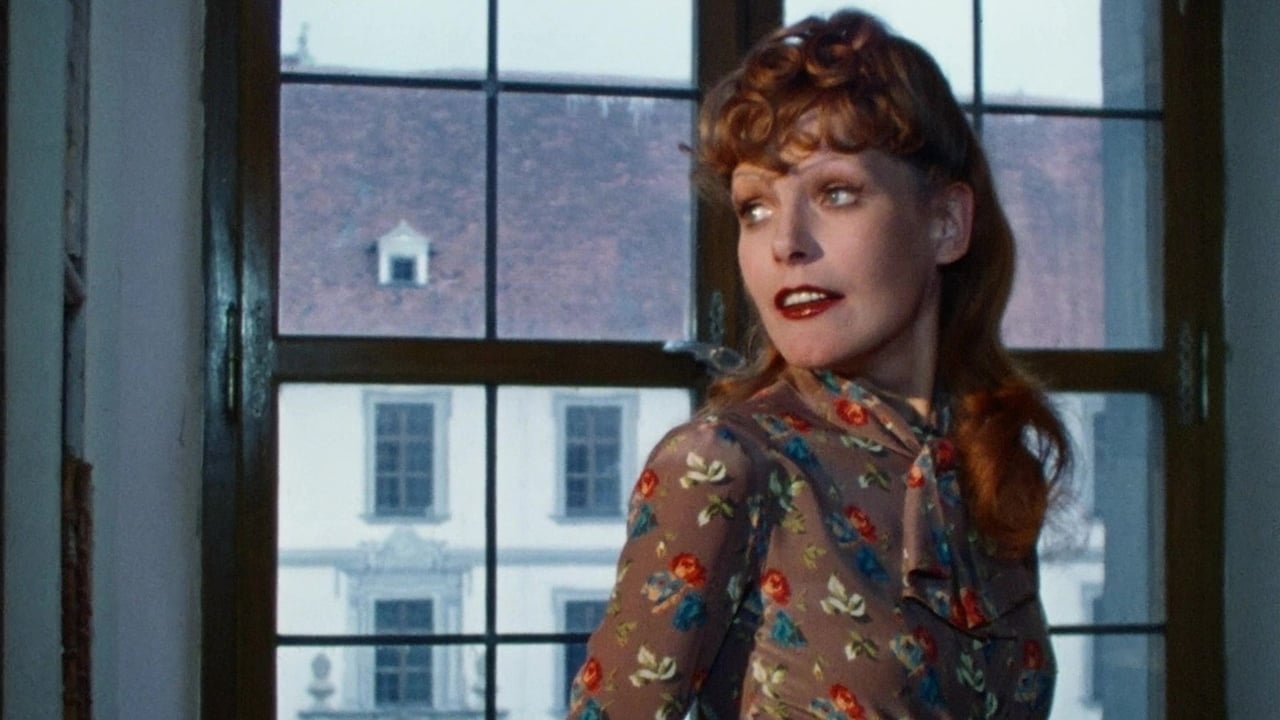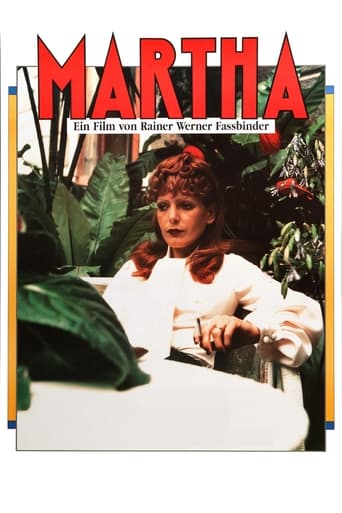Maidexpl
Entertaining from beginning to end, it maintains the spirit of the franchise while establishing it's own seal with a fun cast
Robert Joyner
The plot isn't so bad, but the pace of storytelling is too slow which makes people bored. Certain moments are so obvious and unnecessary for the main plot. I would've fast-forwarded those moments if it was an online streaming. The ending looks like implying a sequel, not sure if this movie will get one
Aubrey Hackett
While it is a pity that the story wasn't told with more visual finesse, this is trivial compared to our real-world problems. It takes a good movie to put that into perspective.
MisterWhiplash
What makes Martha a difficult sit may be hard to communicate in words as the entire atmosphere that Rainer Werner Fassbinder creates is suffocating and strange and deliberately uncomfortable. It's his take on what one might see today actually in Fifty Shades of Grey to an extent, though there's no BDSM (some sex though, and extremely the rough kind), or also to a larger extent Gaslight. The thesis is this: when a woman meets a man who is completely incapable of really being a caring, empathetic person, one of two things will happen - the woman will leave the man (or, perhaps conversely, the man will leave the woman), or the woman will deal as was sort of indoctrinated into certain kinds of women (especially those who wanted a finer life and upper class mobility), and may have to go back and forth on whether to have any independence or to be a figurative door mat for the husband to step on.The emphasis in Martha, which was apparently a made-for-TV movie that Fassbinder happened to squeeze out in the same year of his crushingly sad (and great) Ali: Fear Eats the Soul, is on, like in many of his films, the woman and how she has to somehow simply survive in the world of men and her circumstances. There may even be a slice of Bunuel here too, which I may be inferring with my critic hat on, as it's about this kind of perverse push-and-pull between this couple - Martha meets Helmut (frequent Fassbinder collaborator and muse during this melodrama period of films Margit Carstensen and Karlheinz Böhm respectively) after what is the first of many quasi- absurdly sad moments where her father dies of a heart attack on some steps in Rome - and how there's a slightly sado-masochistic side of things where it shouldn't make sense how she can stand him treating her... and yet, she does, and there's a perversely satirical edge to everything.One should remember that Fassbinder during this time was submerged in Sirk influence too, though I don't know if I detected that so much, aside from some of the heightened melodramatic touches (and the ending, which is really TOO much, but hey, we're already there, why not). There's this underlying subtext to this all that made me think about rich, domineering men *and* the women who become subservient to them. Bohm, also from a few Fassbinder films as well as Peeping Tom, has the face of a man who may be a sadist, but in his mind does he think he's being *fair*? He has the attitude and demeanor of someone who probably would've been right at home in the Nazi party - not that his character espouses racist language so much - it's all in the demeanor and how he treats his wife. A key aspect though is we don't really see what he's like outside of Martha's purview: does he cheat on her (probably), does he act like this when he's off on his, uh, engineering gigs that he forces down Martha's throat (so he can, you know, talk with her about things that interest him), and what about that sexual appetite?The moments where Helmut has his 'way' with Martha is telling, and it's the moments of the film (aside from when Martha really gets hysterical, per the hysteria of the script itself) where there's that Bunuelian sense of... oh, you rich folk, you're so wacky- depraved (and also, as part of the satire, lacking any compassion or soul). He is basically raping Martha to an extent - there's one scene where he kind of makes Martha sit out in the sun so she can 'tan', but her pale skin burns, she lies out naked, and he forces himself on her anyway. And what about Martha? Has she become traumatized by all of this behavior? The gas-lighting part shouldn't be overlooked, though that's only an element of the behavior he puts on her; when I mention 'Fifty Shades', obviously it's not as much a comparison in quality (this is Fassbinder in 1974 for godsakes AND Michael Ballhaus on camera) or in awareness. If 50 Shades knew what images it was really portraying and understood the pitch-black, barely traceable and might as well be a cold heartless drama worldview, it would look like Martha.Oh, and Margrit Carstensen: like some of her work (though not all) for this filmmaker, at times she has a face where there's much more being said in the eyes, tension and fear and confusion and obedience and something that the character may be mistaking for love (or those few bits where it may be clear her father's death f***ed her up more than she's ever dealt with, not to mention her mother and her issues). What's remarkable is that Fassbinder, per the style he's going for which has some cold detachment and a provocation of the audience often to feel for the characters despite the coldness of the tone, still leaves room for Carstensen to make this woman all her own, and that she can find the unfolding tragedy (or tragedies) as each moment of this disaster of a marriage unfolds.The story takes a little time to get going really - that scene at the amusement park on the roller coaster is what hooked me in - but once it does, Martha reveals itself as one of the sickest "comedies" about marriage ever made.
hasosch
"Martha" is part of a series of movies by Rainer Werner Fassbinder, in which he treated different kinds of decrease of mind. In "Merchant of the four seasons" (1972), Fassbinder portrayed the former police officer Hans Epp whose carrier is ruined by a prostitute, whose girl-friend is unreachable for him and whose wife shows no affection to him. After a long time in depression, interrupted by alcohol, he decides to kill himself. In "Martha" (1975), a young woman, hardly released out of the hands of her passed away father, marries a brutal and psychopathic engineer who isolates her from her family, forces her to quit her job, imprisons her in their apartment, cuts down the telephone connection and controls her money. He seems to have reached his goal when Martha, after trying to escape with one of her coworkers, has an accident that paralyzes her, letting her in a wheelchair. In "Fear of Fear" (1975), housewife Margot, pregnant with her second child, starts to suffer from hallucinations while neither her husband nor her mother- and sister-in-law are willing to listen to her. After a physician prescribes her Valium, she increases the dose. When she cannot get enough anymore, she helps herself with alcohol. After having been "healed" in a psychiatric clinic, from which she is released under the promise to take regularly her medication, she is typing addresses on envelopes, pretending to be happy.All of these movies by Fassbinder to which also belong, for instance, "Why does Herr R. run amok" (1970), "In a year with 13 moons" (1978), "Despair" (1978), "Veronika Voss" (1982) and certain episodes of "Berlin Alexanderplatz" (1980), have in common that what turns a human insane is, according to Fassbinder, basically the society in which he or she lives. Neither Hans Epp, nor Martha nor Margot have an emotional support from their family. Let alone by their closest relatives, these individuals are inclined to make false decisions, that lead to decrease of mind and often to suicide. Although Fassbinder repeatedly pretended not to be an intellectual, it is important to point out that we know from the several interviews he gave as well as from his theoretic studies that he was well familiar with the works of the Frankfurt School around Adorno, Horkheimer and Habermas as well as with the psychiatry of Lacan. Therefore, I ask everybody who watches "Martha" to have a close look at the book she is reading in the scene where she sits on the balcony of the hotel in which she stays during her honeymoon. The title of this book is "Das enteignete Bewusstsein", written by Hans Kilian, a sociologists from the Frankfurt School, and appeared in 1971. It turns out that the "expropriated consciousness" – a process committed in society - is the real reason that is responsible for the decline of Hans Epp, Martha, Margot, Peter, Herr R., Erwin/Elvira, Hermann Hermann, Veronika Voss, Hans Biberkopf and many others whose fate has not been subject of any film.
jimi99
Yes, hysterical as in exaggerated comedy, and hysterical as in the title character freaking out over her bizarre, ever-degenerating marriage. This is great Fassbinder film-making--the performances, cinematography, and dialogue are brilliant. As in many of his films, Fassbinder takes a perverse joy in keeping the audience balanced between comedy and melodrama, the laughs always tinged with apprehension. The colors are dominated by lurid reds. The arc of the story keeps one queasy as to how horrible the outcome might be.The famous Sirk influence is very obvious in this as in many of RF's early 70's films, but what struck me is the equally obvious influence of Bunuel on Fassbinder's movies. "Martha" owes a great deal to "Belle du Jour" and "Tristana" among many other of the Spanish master's films about the natural perversity of male-female relationships.
zetes
Good, nearly great Fassbinder about an adult woman who passes from the care of her controlling parents to the even tighter control of a bizarre husband. Margit Carstensen plays the woman and Karlheinz Böhm (whom you probably remember as the protagonist of Michael Powell's Peeping Tom) the husband. This is one of Fassbinder's better films. Jonathan Rosenbaum, who doesn't seem to be much of a Fassbinder enthusiast, cites it as his very favorite. It would rank as one of my favorites, too, but for a couple of reasons. It kind of makes its point fairly early on, especially after the marriage takes place. Then it gets a tad repetitive, and goes on for nearly two hours. The next year, Fassbinder made an even better film dealing with similar themes called Fear of Fear, which also starred Margit Carstensen. Carstensen's performance is exceptional in Martha (and just as good in Fear of Fear), and Böhm is quite good, too.

